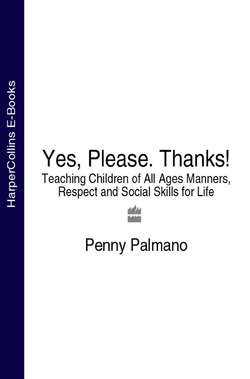Читать книгу Yes, Please. Thanks!: Teaching Children of All Ages Manners, Respect and Social Skills for Life - Penny Palmano - Страница 26
Tantrums (Theirs Not Yours)
ОглавлениеAnytime from when your children are about 18 months you can prepare yourself for the onslaught of the tantrum, the ‘terrible twos’ as they are sometimes known. Toddlers should come with one of those warnings you see at theme parks for the scary rides: ‘If you suffer from a nervous disposition, high-blood pressure or a weak heart …’ But they don’t, and at times, although you may wish to throw your arms in the air and scream, don’t. Stay calm, keep control; you’re in for a rollercoaster ride and when it’s all over, just like the scary ride, you’ll think it wasn’t that bad after all.
Although there will be times when you wonder why you never noticed someone replace your beautiful baby with the spawn of Satan, just remember that children do not have tantrums to anger you. They have them because they are frustrated or angry and they simply don’t know how to express themselves differently. All this said, never, ever give in to a tantrum otherwise they will still be throwing them when they are 19.
Tantrums are like one-man shows: they need an audience to survive and thrive. Remove the audience and the performance will quickly end.
Often there is some incident or response to an incident which ‘lights the blue touch paper’, and they’re off, stamping feet, crying, lying on the floor and kicking, all terribly dramatic. If you are at home and they are not in danger of hurting themselves, simply leave them where they are or put them into their bedroom, on a chair or the floor or the bed and leave. Do not close the door. Don’t raise your voice, get angry or be rough.
Calmly tell them in a firm voice that when they stop crying and behaving in that way, they can come and see you. Then get out of sight, and stay out of sight until the child calms down. With no audience, they will soon stop. When they are calm they will either come to you or you go to them and explain how they should have expressed themselves. Then do not mention the incident again. It’s history. Simply move on and suggest something to do, but never give a sweet or biscuit immediately after a tantrum as this may be seen by the child as a reward. And that’s the last thing we want.
If your child is flailing around and you are worried that he might harm himself, just hold him gently until he settles. If he tries to run off you may have to restrain him with a firmer hand. And if the incident has been sparked by a sweet, or a sibling’s toy, or a piece of clothing, remove it out of sight for the remainder of the day if possible. By the next day it will be forgotten.
If they start to throw a tantrum in the supermarket, immediately take them outside or back to the car. Tell them in a firm voice that they can stop that type of behaviour immediately and let them cool off, then begin again. Under no circumstances leave the food shopping for another day. When your children have settled down explain what you are going to do (the shopping), and ask for their help; if they do help they can have a reward of a sweet or comic afterwards.
Never give in when you are in public because of the fuss they are making. There are loads of parents who are going to recognize what’s happening; we’ve all had children throwing screaming tantrums in public and we will all silently pat you on the back for doing the right thing.
If your child is creating in his pushchair in the supermarket or shop and someone thinks it would be kind to offer the child a sweet, immediately thank them but take it and say that they can have it later.
